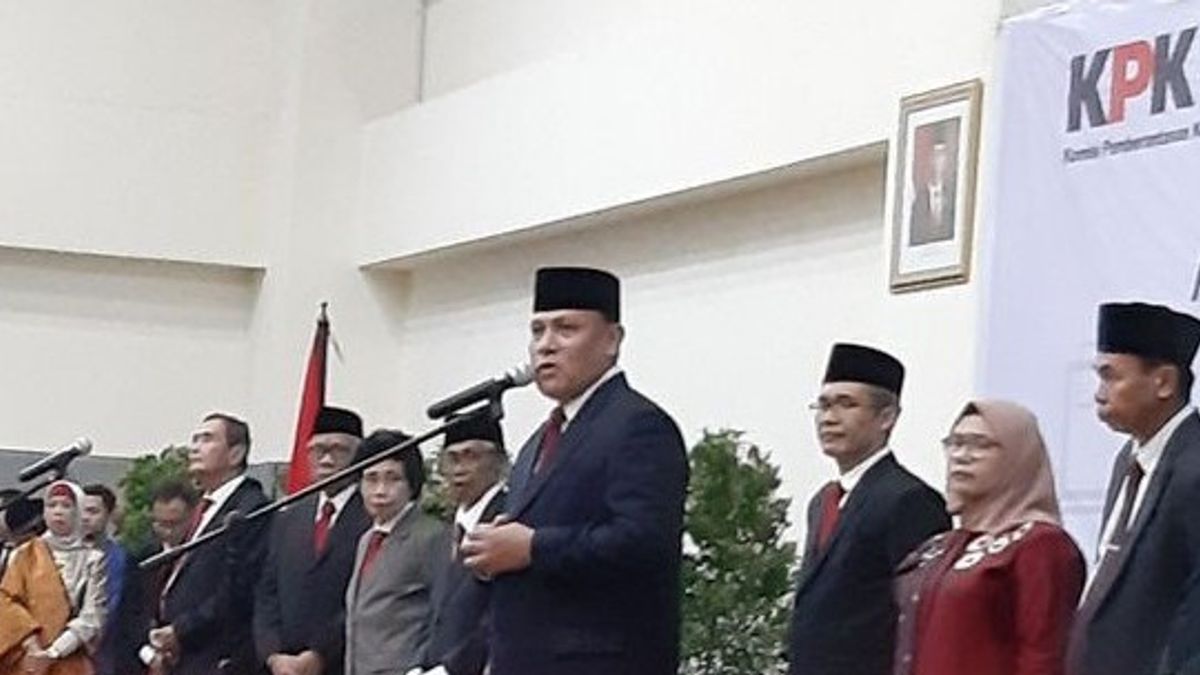JAKARTA - Chairman of the Corruption Eradication Commission (KPK), Firli Bahuri, answered Indonesia's Corruption Watch (ICW) criticism of the large number of fugitives during his leadership. According to Firli, his party has carried out an evaluation of the problem.
As a result, he said, the KPK would not announce the suspects caught in corruption cases before arresting them. So that the suspects do not have time to run away or lose evidence.
"If the suspects run away to become DPOs, of course we will review and evaluate. In the future, if sufficient evidence is obtained, the suspect will be immediately arrested, detained, and only announced," Firli said in a written statement as quoted on Sunday, May 10.
The change in this method, he said, also learned from the experience of the KPK leadership in the previous period. Given that the fugitives who were included in the Wanted List (DPO) were designated as suspects by the KPK leadership in the 2015-2019 period or the Agus Rahardjo period, cs or inheritance.
"It should be remembered that DPO suspects have been named suspects long before. But unfortunately, when they were named suspects, they were not immediately arrested so they (entered) DPO," explained the former South Sumatra Police Chief.
Even though he stated that there was a leadership role in the previous period, Firli did not want to drag on in this mistake. He said, in addition to conducting evaluations and changing methods, the KPK will continue to pursue these fugitives together with the police so that the search scope is wider.
"We have never stopped searching and pursuing suspects with DPO status," said Firli.
Until now, there are at least five fugitives from the KPK. They are suspects in the alleged bribery case against the General Election Commission (KPU) Commissioner Wahyu Setiawan, Harun Masiku, who escaped during an arrest operation (OTT); suspects in the alleged bribery and gratuity case amounting to Rp46 billion, former Secretary of the Supreme Court (MA) Nurhadi and his son-in-law Rezky Herbiyono.
Then, the Director of PT Multicon Indrajaya Terminal, Hiendra Soenjoto and most recently, Samin Tan, are suspects in the alleged bribery case for the termination of the coal mining concession work agreement (PKP2B) PT Asmin Koalindo Tuhup at the Ministry of Energy and Mineral Resources (ESDM).
Reasons Judged IrrelevantIndonesia Corruption Watch (ICW) researcher, Kurnia Ramadhana, assessed that the reason for the announcement of the status of the suspect was irrelevant at the beginning with the large number of fugitives who had escaped.
Given, the suspects usually have already been sent a Notification Letter on the Commencement of Investigation (SPDP) by the KPK before the press conference to determine the suspect was held.
"Linking the announcement of the determination of a suspect by the KPK with the potential for the perpetrator of corruption to run away is actually irrelevant," said Kurnia in a written statement.
According to him, before the suspect's status is announced to the public, this anti-graft agency will of course send a Notification Letter for the Commencement of Investigation (SPDP) to the party designated as a suspect. This, said Kurnia, was in accordance with the mandate of the 2015 Constitutional Court Decision when examining Article 109 paragraph (1) of the Criminal Procedure Code.
The announcement of the determination of the suspect, which is basically Article 5 of the KPK Law, reads: In carrying out its duties and authorities, the KPK is based on the values of openness, accountability and the public interest.
Thus, as a measure of accountability to the public in accordance with the mandate, the easiest step that can be taken is to hold a press conference during the determination of the suspect.
If the KPK is afraid that the suspects who will be announced will even run away, the KPK leadership can use the provisions of Article 12 paragraph (2) letter a in the KPK Law which contains the question of the KPK's authority to order related agencies to prohibit someone from traveling abroad.
"So if you think a suspect has the potential to run away, yes, the KPK just needs to use that provision," he said.
Kurnia also viewed that the number of suspects who escaped to become fugitives to enter the DPO was actually the act of Firli Bahuri and not the act of other parties. He even considered that the narrative of strengthening the KPK and quiet work in the new KPK era was nonsense.
"We suspect that in the KPK prosecution sector in the Firli Bahuri era, we will not do anything. That's why it is called silence," he said.
He also considered that there was no need to blame the system in the KPK that had existed since the previous leadership period. Because, it could be that the fault lies with the current leadership of the Corruption Eradication Commission (KPK). "Maybe it's just the model and way of leadership that's wrong. Not the system," he said.
KPK Must Remain Open to the PublicFormer Deputy Chairman of the KPK, Saut Situmorang, also spoke up about the new style of the KPK which is considered to be able to minimize KPK suspects from escaping or eliminating such evidence.
He said, the style and strategy in carrying out the task of eradicating corruption may change, but the most important thing is the value when carrying it out. Including the value of honesty and transparency.
"Most likely this strategy and tactics can also change, which does not change according to the law enforcement values that you have to carry in your organization. These values are between honesty, truth, and justice. So that later there will be legal certainty, transparency, check. and balances, "said Saut when contacted by reporters.
If existing values, such as disclosure of information, then change to become more closed, it is not impossible to raise suspicion. So, as a former leader, he reminded that every work to eradicate corruption must be carried out with full transparency.
"The greater the closure, the greater the suspicion," he stressed.
"That is why modern management in public policy is openness, including the openness of you to take action or not to take action and to prevent corruption. Where the public, the owner of the funds you use, has the right to have information that you did or did not do something," added Saut.
Moreover, based on its previous experience, the KPK should determine the measure of its work performance or key performance indicator (KPI) first in the field of prosecution then discussing the agreed tactical matters.
"The main thing is what your KPI used to be, what performance did you agree on in terms of prevention and enforcement? That's the main thing. Only then, style, strategy and tactical matters on the KPI that you agreed on," he concluded.
The English, Chinese, Japanese, Arabic, and French versions are automatically generated by the AI. So there may still be inaccuracies in translating, please always see Indonesian as our main language. (system supported by DigitalSiber.id)












